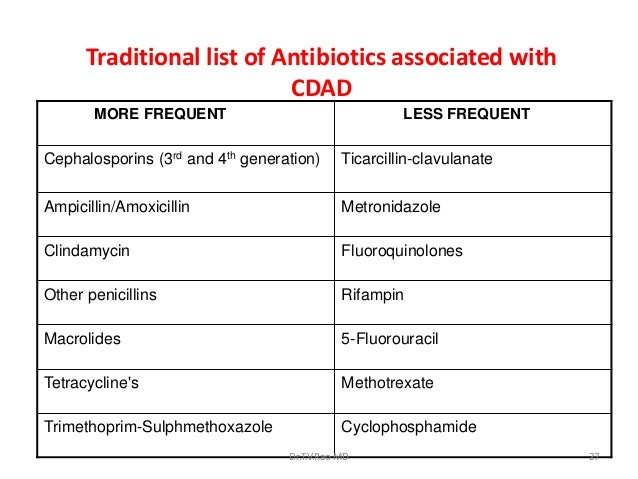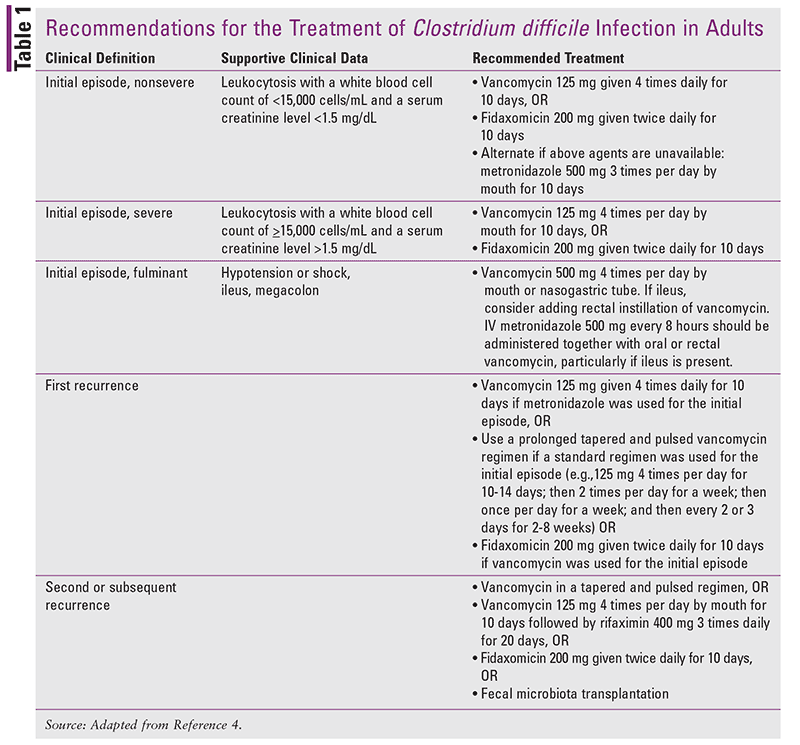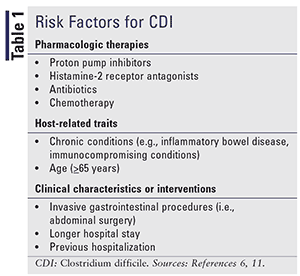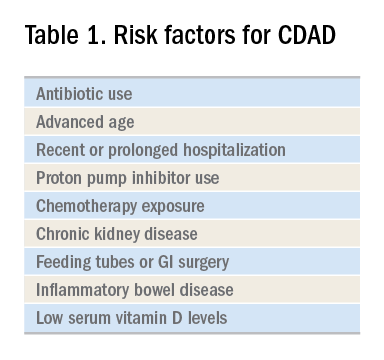- Get link
- X
- Other Apps
- Get link
- X
- Other Apps
The presence of C. Developing diarrhea is fairly common while on or after taking antibiotics but in only a few cases will that diarrhea be caused by C.
 Clostridium Difficile Infection Nejm
Clostridium Difficile Infection Nejm
My son had C.

C diff and antibiotics. 3-5 Fluoroquinolones cephalosporins aztreonam and carbapenems carry a fairly high risk all of which being associated with an odds ratio of approximately 5 compared to no antibiotic exposure. Have been taking antibiotics that work against several types of bacteria broad-spectrum antibiotics or several different antibiotics at the same time or those taking long-term antibiotics have had to stay in a healthcare setting such as a hospital or care home for a long time are over 65 years old. Most cases are mild but Clostridium difficile infection causes a spectrum of disease ranging from occasional diarrhoea to colitis toxic megacolon and potentially death.
Its a cost-effective first-line treatment for mild-to-moderate C diff symptoms. Click to see full answer. Due to this loss of good bacteria people taking antibiotics are 7 to 10 times more likely to contract c.
Any antibiotic including Flagyl on rare occasions can cause C. Antibiotics alter the normal levels of bacteria found in the gut. When this happens the number of c.
Several important mechanisms for C. Thats because antibiotics that fight bacterial infections by killing bad germs can also get rid of the good germs that protect the body against harmful infections like C. Difficile antibiotic resistance have been described including the acquisition of antibiotic resistance genes via the transfer of mobile genetic elements selective pressure in vivo resulting in gene mutations altered expression of.
In some clinical situations where infection is one of several possibilities. Different transfer mechanisms facilitate the spread of mobile elements among C. Difficile has a multifactorial nature.
Sometimes general antibiotics can kill the bacteria that keep c. Diff bacteria is commonly found in the environment but most cases of C. It will also minimise the many side effects associated with antibiotic prescribing such as Clostridium difficile infection.
People are 7 to 10 times more likely to get C. People on antibiotics are 7 to 10 times more likely to get C. According to the American Society of Gastroenterology three antibiotics are generally chosen to treat C diff.
Metronidazole Flagyl is an antibiotic used to treat parasitic and bacterial infections. Good antimicrobial prescribing will help to reduce the rate at which antibiotic resistance emerges and spreads. Diff occur while youre taking antibiotics or not long after youve finished taking antibiotics.
It should be borne in mind that antibiotics are not needed for simple coughs and colds. Antibiotic-associated diarrhoea is among the most common adverse events related to antibiotic use. Both antibiotic prescribing practice and the epidemiology ofCdifficileinfections are changing.
Diff bacteria grow and cause an infection that results in diarrhea fever and abdominal pain. Twice -- once from ERYC a form of erythromycin. When there are fewer bacteria in our gut C.
Many years later he was able to tolerate a Z-pak which is broader spectrum. If your diarrhea is severe do not delay getting medical care. Antibiotic resistance in C.
Diff while on the drugs and during the month after. Oral antibiotics such as metronidazole vancomycin and fidaxomicin are therapies of choice for Clostridium difficile infection. Difficile bacteria have the chance to thrive and produce toxins.
Although no particular antibiotics can be ruled out those most commonly implicated in C. The study concluded that overuse of antibiotics like ciprofloxacin led to the outbreak of severe diarrhoea caused by Clostridium difficile Cdiff that hit headlines from 2006 onwards. Certain antibiotics used in high doses or over a prolonged period of time will increase the chance of developing a C.
Subsequently since the early 1990s the antibiotics most commonly reported as being associated withCdifficile infection were cephalosporins and quinolones. Diff you should see a healthcare professional. Acquisition of genetic elements and alterations of the antibiotic target sites as well as other factors such as variations in the metabolic pathways and biofilm production contribute to the survival of this pathogen in the presence of antibiotics.
R estricting the use of a common antibiotic was more important than a high profile deep clean of hospitals in massively reducing UK antibiotic resistant Clostridium difficile a major study found. Antibiotic guidelines steadily adopted that evidence. Difficile infection are clindamycin cephalosporins in particular second and thirdgeneration cephalosporins quinolones coamoxiclav and aminopenicillins for example ampicillin and amoxicillin which may be related to their volume of use rather than being high risk NICE clinical.
Cdifficilehas been reported with clindamycin since 1978 Bartlett etal. Diff mostly affects people who. Without a doubt clindamycin carries the highest risk of C difficile infection with an odds ratio of about 17-20 compared to no antibiotic exposure.
These toxins can damage the bowel and cause diarrhea. If you have been taking antibiotics recently and have symptoms of C. Diff while on antibiotics and during the month after.
This isnt a guanantee that it wont cause C.
 Clostridium Difficile By Dr T V Rao Md
Clostridium Difficile By Dr T V Rao Md
 Differences Between Antibiotic Associated Diarrhea From C Difficile Download Table
Differences Between Antibiotic Associated Diarrhea From C Difficile Download Table
My Difficulty With C Difficile British Columbia Medical Journal
Report Of Two Cases Of Recurrent Clostridium Difficile Infections In Children And Literature Review
 Microbiologic Factors Affecting Clostridium Difficile Recurrence Clinical Microbiology And Infection
Microbiologic Factors Affecting Clostridium Difficile Recurrence Clinical Microbiology And Infection
 Update On Treatment Of Clostridioides Difficile Infection Mayo Clinic Proceedings
Update On Treatment Of Clostridioides Difficile Infection Mayo Clinic Proceedings
 Recurrent Clostridioides Difficile Infection Recognition Management Prevention Cleveland Clinic Journal Of Medicine
Recurrent Clostridioides Difficile Infection Recognition Management Prevention Cleveland Clinic Journal Of Medicine
 Clostridium Difficile Infection An Introduction And Overview Global Academy For Medical Education
Clostridium Difficile Infection An Introduction And Overview Global Academy For Medical Education
 Updates In The Management Of Clostridium Difficile For Adults
Updates In The Management Of Clostridium Difficile For Adults
 Clostridium Difficile Infection Emerging Therapies And Current Standards Of Care
Clostridium Difficile Infection Emerging Therapies And Current Standards Of Care
My Difficulty With C Difficile British Columbia Medical Journal
 Risk Of Clostridium Difficile For Different Antibiotics Download Table
Risk Of Clostridium Difficile For Different Antibiotics Download Table
 How Do You Evaluate And Treat A Patient With C Difficile Associated Disease The Hospitalist
How Do You Evaluate And Treat A Patient With C Difficile Associated Disease The Hospitalist
 Differences Between Antibiotic Associated Diarrhea From C Difficile Download Table
Differences Between Antibiotic Associated Diarrhea From C Difficile Download Table
Comments
Post a Comment